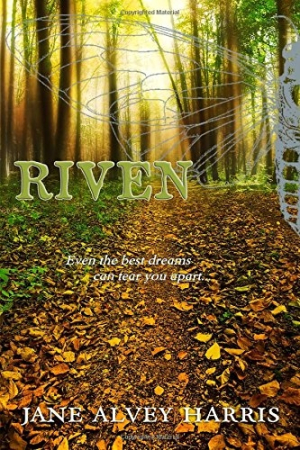
Riven
The confusion of adolescence is captured in hi-fi, and the seams of identity are exposed in all of their ragged beauty.
Jane Alvey Harris’s Riven traces a critical juncture in a teen’s mental health. When an elaborate fantasy threatens to take over her life, she learns to transform her fear into courage and self-acceptance. A deftly constructed, hyper-real world reveals the effects of extreme pressure on a family torn by abuse.
Seventeen-year-old Emily is the novel’s vulnerable, distraught protagonist. Held back to repeat her junior year, she depends on prescription drugs. She’s left responsible for her younger siblings while her mother struggles with depression, and is troubled by her imprisoned father’s upcoming release.
Emily soon gives in to stress and retreats into a childhood world. The First Realm, which is populated by maidens and elves, begins as a story she invented to help her survive past trauma, and gains importance when she can’t explain why she dreads her father’s return. As the line between fiction and reality dissolves, Emily summons her strength in a fight against psychosis.
The novel features topics for mature teens, including self-injury, an overdose, and recovered memories. Together they create a firestorm in Emily’s life without glamorizing despair and addiction. Emily’s unreliable account—fueled by Valium and Ambien—is heightened in tone. It fits her character, even as it results in a highly filtered perception that views adults in stark, black-and-white terms.
Emily’s mother is portrayed as a delicate, revered force. Her father is an untrustworthy, treacherous figure. Her relatives, who step in to care for the Alvey children, are well-meaning people who remain at a distance. Two crushes become idealized figures. Emily’s siblings, however, are well-drawn allies whose enchantment with her stories reveals a closeness that buoys her through tough circumstances.
Each of the main characters has a counterpart in the First Realm, allowing a detailed battle to unfold in Emily’s imagination. That alternate world functions as an understandably escapist means for confronting some of her pain. Through fantasy, Emily gains the power she didn’t possess when she was victimized. She also works through her fear of judgment and exposure. In one of the book’s psychologically intriguing arcs, the integration of multiple voices leads to the start of Emily’s healing.
Riven is unsparing in its depiction of emotional withdrawal. The story of a mind in crisis takes shape through frenetic transitions between the First Realm and Emily’s daily life. The confusion of adolescence is captured in hi-fi, and the seams of identity are exposed in all of their ragged beauty.
Reviewed by
Karen Rigby
Disclosure: This article is not an endorsement, but a review. The publisher of this book provided free copies of the book and paid a small fee to have their book reviewed by a professional reviewer. Foreword Reviews and Clarion Reviews make no guarantee that the publisher will receive a positive review. Foreword Magazine, Inc. is disclosing this in accordance with the Federal Trade Commission’s 16 CFR, Part 255.
